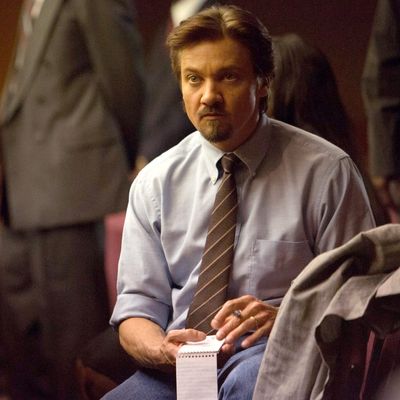
Michael Cuesta’s Kill the Messenger made me so angry over the apparent injustice done to its journalist hero, Gary Webb (Jeremy Renner), that I found it hard to remain in my seat. Actually, I didn’t — I walked out three-quarters of the way in, but only to a nearby corridor, where I could hear the soundtrack and also access Wikipedia on my phone. Cowardly, I know. But I wanted to read in advance about Webb’s fate so I could steel myself for the grim finale.
Webb was a reporter for the San Jose Mercury News, for which, in 1996, he broke one of the most amazing and disgusting U.S.-based stories of the last two decades (which is saying something). Following the trail of a notorious crack dealer, he discovered that, in return for cash funneled to the Nicaraguan contras (that part of the story was well known), the CIA smuggled gobs of cocaine into the country. The agency was, in effect, helping to facilitate what became the crack epidemic among the urban poor. African-American leaders were, in particular, outraged. It was their communities that bore the brunt of the horror that followed.
You’d expect the CIA to try to frighten and then discredit Webb. What blindsided him was that the biggest attacks came from other journalists, particularly at the Los Angeles Times, the Washington Post, and the New York Times. This was largely, the movie says, the upshot of professional jealousy. Editors at the Los Angeles Times in particular — led by Shelby Coffey III, who isn’t named onscreen — couldn’t stand the thought of having missed a story in their own backyard, especially to a paper as small-time as the Mercury News. They put out a hit team on Webb.
The evidence amassed in favor of Webb’s work by Nick Schou (who wrote the book Kill the Messenger) is convincing — and so are the attacks on journalists like the Post’s Walter Pincus, the Los Angeles Times’ Doyle McManus and Jesse Katz (who made a weasely half-admission that mistakes were made in a radio interview), and the New York Times’ Tim Golden and Iver Peterson. In perhaps the ultimate et tu, Brute?, the Mercury News issued a front-page report on Webb’s mistakes. He did make a few of them, but not enough to undermine the larger story. (The eventual release of CIA documents — and good articles in Esquire* — vindicated much of Webb’s reporting, but too late to do him any good. The L.A. Times and most other papers buried this news.)
The script by Peter Landesman is a solid muckraking job, and Cuesta—best known for directing prestige TV pilots and episodes of Homeland when it was good — takes its visual cues from ‘70s paranoid conspiracy thrillers like All the President’s Men and The Parallax View. Parking garages factor in. Long shots of Webb suggest that someone’s always watching. Renner is a gut actor, which helps make the movie seem less pointy-headed and more about a guy driven by pride to do his job better than anyone else. First approached by a hotcha woman (Paz Vega) on behalf of a coke dealer who’s on trial, Webb dogs the D.A. (Barry Pepper) who’s doing the government’s bidding, and then civilly but firmly tells the CIA he won’t lay off the story. (One agent says to him, “We’d never threaten your children, Mr. Webb.” Nice formulation!) Renner’s Webb isn’t terribly stable. He does, indeed, have a skeleton in his closet. And he’s increasingly unhinged by the attacks on him. But the film suggests that he might have come through if his own paper hadn’t thrown him under a bus.
Mary Elizabeth Winstead is fine as the editor who supports and then backs away from Webb, unable to overrule her publisher (Oliver Platt at his most unctuously insincere). Michael Sheen plays an especially jittery source. In the film’s weirdest and most stylized scene, Webb receives a nocturnal motel-room visit from an ex-agent played by Ray Liotta. Photographed in near darkness, Liotta is a subterranean creature who can’t stand the light but is driven above ground by a fevered conscience.
I’d love to see a point-by-point refutation of the film by some of the story’s real-life participants, but as most are unnamed, I doubt they’ll want to bring attention to themselves. And if the rise of the internet has achieved one thing, it’s that it enables fact-checkers to be on big-name journalists’ cases: They can’t entirely control the story anymore. If the filmmakers’ version of events is true, those reporters whose chief goal was to tear Webb apart should be made to watch Kill the Messenger while wearing signs around their necks that read “UNCLEAN.”
*For a more in-depth look at Esquire’s honorable journalistic history, see Tom Hayes’s recent documentary Smiling Through the Apocalypse: Esquire in the Sixties.





